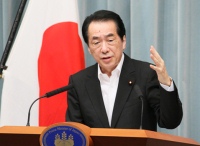Kan's vision opens nuclear debate
14 July 2011
The debate on Japan's future energy policy has started early with some seemingly contradictory statements from politicians.
 |
Naoto Kan's statements yesterday have
confused industry, the public and
government alike |
Prime minister Naoto Kan was quick to announce a from-scratch review of energy policy within days of the Fukushima accident. He said at the time that nuclear power would remain as one pillar of the energy system, along with fossil fuels. His idea was to add one pillar of renewable energy and another of efficiency to control demand.
This review and new policy set is still forthcoming, but national broadcaster NHK featured Kan yesterday saying he believed "Japan should aim for building a society that is not dependent on nuclear power." He wanted to reduce the use of nuclear energy "in a planned and phased manner, so that future society will be sustained without it."
A common reaction from industry and local leaders, as well as some other areas of government, was a call for the full implications to be considered before any decisions are made. Today chief cabinet secretary Yukiyo Edano sought to clarify the government's position in an official statement: "I think the prime minister's announcement outlined a plan for the country to reduce its dependency on nuclear energy in stages. I understand that it is a starting point for launching a national debate on the issue."
Ending the use of nuclear power would not be easy. Japan turned strongly towards nuclear power in the 1970s for its security, reliability and economics in the context of a large, advanced economy with a strong manufacturing sector. Nuclear was used to offset oil imports and grew to provide about 30% of electricity. Some of the 51 reactors now operable in the country have expected lifespans out to around 2065 and nuclear had been set to expand to 40%.
Japanese nuclear power currently avoids the emission of some 210 million tonnes of carbon dioxide per year compared to a mix of oil and gas, making it essential to climate change commitments, said the Ministry of the Environment.
However, much of the fleet currently lies idle, awaiting local political support before routine restarts are authorised. To secure that, a program of stress tests has been proposed in addition to the recommendations issued promptly by the Nuclear and Industrial Safety Agency after the tsunami of 11 March.
Kan faced calls for his resignation in the weeks after the Fukushima crisis and he has promised to resign once the Daiichi plant is stabilised. He set the goal of cold shutdown for the three ruined reactor cores as a pre-requisite for evacuees to return home, but the term means little for such damaged units. Although temperature and pressure readings from unit 3 continue to oscillate, those from units 1 and 2 have been stable for several weeks - albeit at above the 100ºC that defines the cold shutdown status.
Researched and written
by World Nuclear News